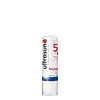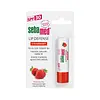What's inside
What's inside
 Key Ingredients
Key Ingredients

 Benefits
Benefits

 Concerns
Concerns

 Ingredients Side-by-side
Ingredients Side-by-side

Ricinus Communis Seed Oil
MaskingCera Alba
EmollientDibutyl Adipate
EmollientDiethylamino Hydroxybenzoyl Hexyl Benzoate
UV FilterDiethylhexyl Butamido Triazone
UV AbsorberC12-15 Alkyl Benzoate
AntimicrobialDicaprylyl Carbonate
EmollientButyrospermum Parkii Butter
Skin ConditioningEthylhexyl Triazone
UV AbsorberArgania Spinosa Kernel Oil
EmollientEuphorbia Cerifera Cera
AstringentTocopheryl Acetate
AntioxidantZinc Oxide
Cosmetic ColorantBis-Ethylhexyloxyphenol Methoxyphenyl Triazine
Skin ConditioningAroma
Ethylhexyl Salicylate
UV AbsorberBisabolol
MaskingRicinus Communis Seed Oil, Cera Alba, Dibutyl Adipate, Diethylamino Hydroxybenzoyl Hexyl Benzoate, Diethylhexyl Butamido Triazone, C12-15 Alkyl Benzoate, Dicaprylyl Carbonate, Butyrospermum Parkii Butter, Ethylhexyl Triazone, Argania Spinosa Kernel Oil, Euphorbia Cerifera Cera, Tocopheryl Acetate, Zinc Oxide, Bis-Ethylhexyloxyphenol Methoxyphenyl Triazine, Aroma, Ethylhexyl Salicylate, Bisabolol
Caprylic/Capric/Succinic Triglyceride
EmollientCera Alba
EmollientIsoamyl P-Methoxycinnamate
UV AbsorberRicinus Communis Seed Oil
MaskingCaprylic/Capric Triglyceride
MaskingEthylhexyl Salicylate
UV AbsorberTocopheryl Acetate
AntioxidantC12-15 Alkyl Benzoate
AntimicrobialOryza Sativa Bran Cera
Skin ConditioningCetyl Dimethylbutyl Ether
Skin ConditioningParfum
MaskingSodium Chloride
MaskingSodium Sulfate
CI 77499
Cosmetic ColorantClay
AbsorbentSimmondsia Chinensis Seed Oil
EmollientRice Bran Acid
CleansingOryza Sativa Bran Oil
EmollientBisabolol
MaskingCaprylic/Capric/Succinic Triglyceride, Cera Alba, Isoamyl P-Methoxycinnamate, Ricinus Communis Seed Oil, Caprylic/Capric Triglyceride, Ethylhexyl Salicylate, Tocopheryl Acetate, C12-15 Alkyl Benzoate, Oryza Sativa Bran Cera, Cetyl Dimethylbutyl Ether, Parfum, Sodium Chloride, Sodium Sulfate, CI 77499, Clay, Simmondsia Chinensis Seed Oil, Rice Bran Acid, Oryza Sativa Bran Oil, Bisabolol
 Reviews
Reviews

Ingredients Explained
These ingredients are found in both products.
Ingredients higher up in an ingredient list are typically present in a larger amount.
Bisabolol is famous for its skin soothing properties. It does this by blocking inflammatory signals, helping to reduce your body's reaction to irritation.
This ingredient also interferes with the process of hyperpigmentation. This can help with reducing dark spots and uneven tone.
Bisabolol is an antioxidant. Antioxidants help fight free-radicals. Free-radicals are molecules that may damage your skin cells. By fighting these free-radicals, Bisabolol may slow down signs of aging.
Studies have shown Bisabolol to have antimicrobial properties and may be a fungicide. These properties help preserve a product's shelf life.
All these properties makes bisabolol a great skin barrier helper ingredient.
Bisabolol also helps the absorption of other ingredients.
Note: Synthetic Bisabolol has been shown to be less effective.
Learn more about BisabololC12-15 Alkyl Benzoate is made up of Benzoic Acid and long chain alcohols. It has a low molecular weight.
C12-15 Alkyl Benzoate is an emollient and texture enhancer. Due to its solubility, it is often used in sunscreens to help evenly distribute active ingredients.
As an emollient, C12-15 Alkyl Benzoate helps soften and hydrate your skin. Emollients create a film on your skin that traps moisture within.
This ingredient has been reported to cause eye irritation.
Learn more about C12-15 Alkyl BenzoateCera alba is beeswax, or the wax used by bees to make honeycombs. It is a texture-enhancer and emollient. A study from 2003 found beeswax to be a stronger emollient than ingredients such as petroleum jelly.
As an emollient, beeswax helps hydrate the skin by creating a barrier on top. This barrier traps moisture in.
Emulsifiers help prevent ingredients from separating. This helps create consistent texture.
The structure of beeswax is mainly long-chain alcohols and the esters of fatty acids.
There are three types of beeswax: yellow, white, and absolute. Yellow is pure beeswax taken from the honeycomb. White beeswax is created by filtering or bleaching yellow beeswax. Absolute beeswax is created by treating beeswax with alcohol. Beeswax used in cosmetics are purified.
Beeswax has been used throughout history and even in prehistoric times. Some common uses for beeswax still used today are making candles, as a waterproofing agent, and polish for leather.
Learn more about Cera AlbaEthylhexyl Salicylate is an organic compound used to block UV rays. It primarily absorbs UVB rays but offers a small amount of UVA protection as well.
Commonly found in sunscreens, Ethylhexyl Salicylate is created from salicylic acid and 2-ethylhexanol. You might know salicylic acid as the effective acne fighter ingredient and BHA.
The ethylhexanol in this ingredient is a fatty alcohol and helps hydrate your skin, similar to oils. It is an emollient, which means it traps moisture into the skin.
According to manufacturers, Ethylhexyl Salicylate absorbs UV wavelength of 295-315 nm, with a peak absorption at 307-310 nm. UVA rays are linked to long term skin damage, such as hyperpigmentation. UVB rays emit more energy and are capable of damaging our DNA. UVB rays cause sunburn.
Learn more about Ethylhexyl SalicylateRicinus Communis Seed Oil is the INCI name for castor oil.
Castor Oil helps moisturize the skin. It is rich in a fatty acid called ricinoleic acid. This fatty acid helps prevent moisture loss on the skin. This helps keep your skin soft and hydrated. Ricinoleic acid also has anti-inflammatory and pain reducing properties.
Besides hydrating the skin, castor oil is also used to hydrate hair. By keeping the hair shaft moisturized, breakage is decreased. More studies are needed to show castor oil's effective on stimulating hair growth.
Castor oil is created by cold-pressing castor seeds and then purifying the oil with heat. It was used in Ancient Egypt as fuel in lamps and to help treat eye irritation.
The term 'fragrance' is not regulated in many countries. In many cases, it is up to the brand to define this term. For instance, many brands choose to label themselves as "fragrance-free" because they are not using synthetic fragrances. However, their products may still contain ingredients such as essential oils that are considered a fragrance.
Learn more about Ricinus Communis Seed OilTocopheryl Acetate is AKA Vitamin E. It is an antioxidant and protects your skin from free radicals. Free radicals damage the skin by breaking down collagen.
One study found using Tocopheryl Acetate with Vitamin C decreased the number of sunburned cells.
Tocopheryl Acetate is commonly found in both skincare and dietary supplements.
Learn more about Tocopheryl Acetate